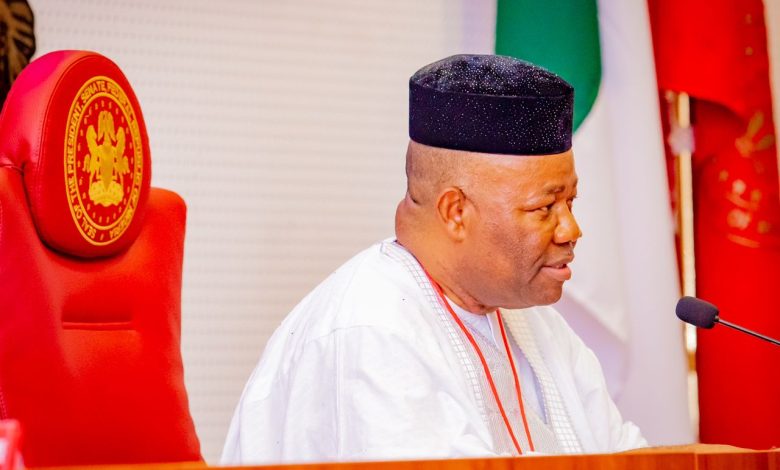
The Federal Government has moved to charge nine individuals over the spread of false reports alleging that the Department of State Services (DSS) laid siege to the National Assembly to impeach Senate President Godswill Akpabio.
The government has filed a six-count charge, including cyber defamation and spreading false news with intent to cause public fear.
The charges stem from an article published on 16 October 2024 on the Order Paper’s platform, which accused the DSS of planning an unlawful intervention in the Senate’s leadership.
The charges were officially filed on 21 October 2024 by A. A. Yusuf, the Deputy Director of Public Prosecution of the Federation, at the Federal High Court in Abuja.
The government accused the defendants of attempting to incite public unrest by falsely claiming that the DSS orchestrated a plot to impeach the Senate President.
The charge sheet identifies nine defendants, including the Incorporated Trustee of Order Paper, Oke Epia (the platform’s founder and Executive Director), Tony Okeke Ofodile (Head of Operations), Edna Bill Ulaeto (Admin/Finance Executive), and several other staff members.
Cyber Defamation and False Information
The charges against the defendants are wide-ranging. One count states that Order Paper knowingly published false information “with the intent to harm the reputations” of both the DSS and Senate President Akpabio.
This alleged act is seen as a violation of Section 24(1)(b) of the Cybercrimes (Prohibition, Prevention, Etc.) Act 2015, which prohibits defamatory statements made online.
According to the Federal Government, the platform not only defamed key political institutions but also attempted to “bring them into public ridicule.”
The government’s charges reflect a broader effort to clamp down on misinformation, especially regarding sensitive political matters.
Section 375 of the Criminal Code Act, cited in the charge, further underscores the weight of the allegations.
The defendants are also accused of violating this section by allegedly injuring the DSS’s reputation and spreading defamatory content.
The government charged the defendants with defamation and publishing false news with the intent to cause public fear and disturbance.
This count, drawn from Section 59 of the Criminal Code Act, is based on the government’s claim that the published report led to widespread alarm.
The Federal Government asserts that the article was designed to incite fear of political instability, a highly sensitive issue given the ongoing political developments in Nigeria.
Government’s Stance on Misinformation
The government’s move to bring legal action against Order Paper and its staff highlights the growing tensions between the media and the state, particularly in the digital age.
In recent years, Nigeria has seen an increase in false reports and rumours spreading online, which often carry serious political consequences. The Federal Government’s legal actions against the media organisation signal a zero-tolerance policy towards misinformation and reflect its resolve to uphold national security.
However, some critics argue that such actions could potentially curb freedom of speech and stifle journalistic activities.
While the government maintains that the defendants knowingly spread false information, others question whether the charges might be politically motivated, considering the high-profile nature of the individuals involved. This case is expected to set a precedent in how Nigerian authorities handle cyber defamation and misinformation cases.
Defendants Await Arraignment
The nine individuals facing charges include both senior and junior staff members of Order Paper, a media platform known for covering political events.
Besides Epia and Ulaeto, those charged include Leah Twaki, a Social Media Executive, and Elizabeth Atime, the author of the report in question.
The charge sheet reads, “That you, Order Paper, through your agents, knowingly published false information via your online platform, alleging that the DSS laid siege to the National Assembly, which you knew to be false.”
Although the charges were filed on 21 October 2024, no date has been set for the defendants’ arraignment. Should the court rule in favour of the prosecution, the accused face heavy penalties, including fines and potential imprisonment under Nigeria’s Cybercrimes Act.
Broader Implications
The case has sparked debates about the balance between controlling misinformation and ensuring freedom of the press.
Analysts have warned that the outcome of the trial could influence how news outlets report sensitive political issues in the future. It also raises concerns about the level of scrutiny media organisations face, particularly about reporting on top government officials and security agencies.
The Federal Government insists that the charges are necessary to protect the integrity of the country’s institutions, with a representative stating, “We cannot allow false information to go unchecked, especially when it threatens to destabilise the political environment.”
With public attention now firmly on the case, it remains to be seen how the court will rule and what lasting impact this case will have on Nigeria’s media landscape and the practice of online journalism.
